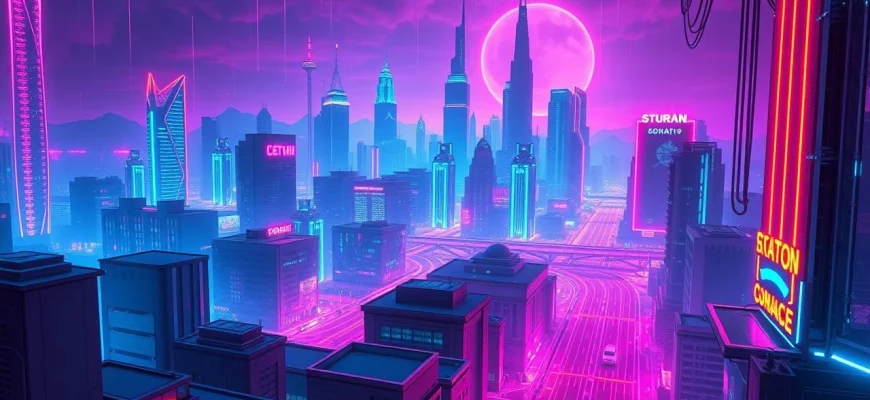If you're a fan of the groundbreaking sci-fi classic 'Tron' (1982), you're likely drawn to its unique blend of futuristic visuals, digital worlds, and thrilling adventure. This article is your gateway to 10 similar movies and shows that capture the same electrifying spirit, whether through their cyberpunk aesthetics, virtual reality themes, or high-stakes battles within digital realms. Dive in to discover your next favorite tech-driven escape!
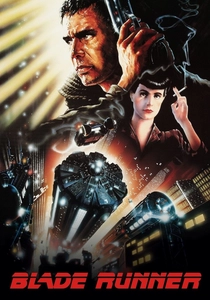
Blade Runner (1982)
Description: Blade Runner, released the same year as Tron, shares its cyberpunk aesthetic and themes of technology's impact on humanity. Both films explore the boundaries between human and machine, with Blade Runner focusing on replicants and Tron on programs within a computer. The neon-lit, rain-soaked cityscapes of Blade Runner parallel Tron's glowing digital landscapes, creating a similar visual tone. Additionally, both films question what it means to be alive and the nature of consciousness.
Fact: Blade Runner is based on Philip K. Dick's novel 'Do Androids Dream of Electric Sheep?' The film initially underperformed at the box office but later gained a cult following. Ridley Scott's director's cut, released in 1992, removed the original voice-over narration and changed the ending.
 Watch Now
Watch Now 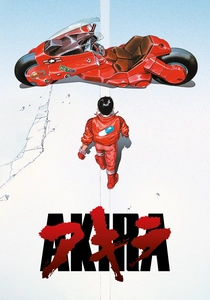
Akira (1988)
Description: Akira shares Tron's themes of technological advancement and its impact on humanity. Both films feature protagonists who gain extraordinary abilities within their respective worlds, leading to conflicts with oppressive forces. The neon-lit, cyberpunk aesthetic of Akira's Neo-Tokyo parallels Tron's digital landscapes. Additionally, both films explore the idea of individuals transcending their physical limitations through technology.
Fact: Akira is based on Katsuhiro Otomo's manga of the same name. The film was one of the first anime features to gain widespread international recognition. Akira's motorcycle chase scene is considered one of the most iconic sequences in anime history.
 Watch Now
Watch Now 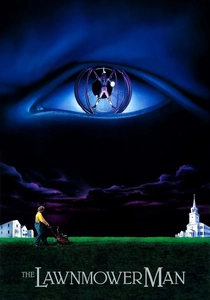
The Lawnmower Man (1992)
Description: The Lawnmower Man explores similar themes to Tron, particularly the idea of humans entering and interacting with virtual worlds. Both films depict the potential dangers of advanced computer technology and its effects on the human mind. While The Lawnmower Man's visual effects are more primitive than Tron's, both films were groundbreaking in their use of computer-generated imagery to represent digital environments. The films also share a cautionary tone about the unchecked advancement of technology.
Fact: The Lawnmower Man was loosely based on a short story by Stephen King, who later sued to have his name removed from the film. The film's virtual reality sequences were created using early CGI technology. The Lawnmower Man was one of the first films to popularize the concept of virtual reality in mainstream cinema.
 Watch Now
Watch Now 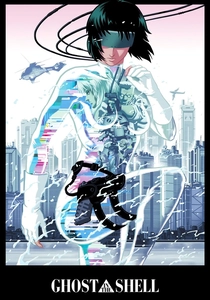
Ghost in the Shell (1995)
Description: Ghost in the Shell, like Tron, delves into the merging of human consciousness with digital technology. Both films feature protagonists who navigate cybernetic worlds and question the nature of their existence. The visual style of Ghost in the Shell, with its futuristic cityscapes and digital interfaces, shares Tron's cyberpunk influences. The films also explore themes of identity, free will, and the potential dangers of advanced technology.
Fact: Ghost in the Shell is based on the manga of the same name by Masamune Shirow. The film's animation was groundbreaking for its time, blending traditional cel animation with computer-generated imagery. The Wachowskis cited Ghost in the Shell as a major influence on The Matrix.
 Watch Now
Watch Now 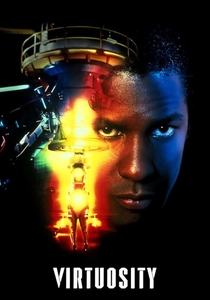
Virtuosity (1995)
Description: Virtuosity shares Tron's exploration of digital entities entering the physical world. Both films feature antagonists who are artificial intelligences with the ability to manipulate their environments. The visual effects in Virtuosity, particularly in its virtual reality sequences, echo Tron's pioneering use of CGI. The films also both examine the ethical implications of creating sentient digital beings and the potential consequences of their existence.
Fact: Virtuosity stars Denzel Washington and Russell Crowe in one of his early Hollywood roles. The film's virtual reality sequences were inspired by the emerging VR technology of the mid-1990s. Virtuosity was one of the first films to explore the concept of a digital serial killer.
 Watch Now
Watch Now 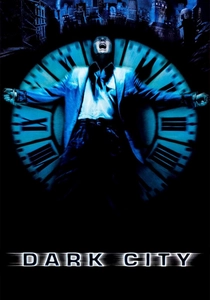
Dark City (1998)
Description: Dark City, like Tron, features a protagonist who discovers that his reality is not what it seems. Both films explore themes of memory, identity, and the manipulation of reality by unseen forces. The noir-inspired visual style of Dark City, with its stark contrasts and surreal cityscapes, creates a similar sense of disorientation to Tron's digital world. The films also share a philosophical depth, questioning the nature of existence and free will.
Fact: Dark City was directed by Alex Proyas, who also directed The Crow. The film's production design was heavily influenced by German Expressionism and film noir. Dark City was overshadowed by The Matrix's release but has since gained a cult following.
 Watch Now
Watch Now 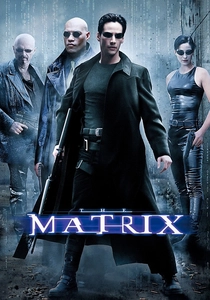
The Matrix (1999)
Description: Similar to Tron (1982), The Matrix explores the concept of a digital world where humans are unknowingly trapped inside a simulated reality. Both films feature protagonists who break free from the system and fight against oppressive digital entities. The visual aesthetics of The Matrix, with its green-tinted digital landscapes and cyberpunk elements, echo the neon-lit, computer-generated world of Tron. Additionally, both films delve into themes of identity, control, and the blurring line between reality and virtual existence.
Fact: The Matrix was heavily influenced by cyberpunk literature, including works by William Gibson and Philip K. Dick. The film's iconic 'bullet time' effect was achieved using a combination of still cameras and computer-generated imagery. Keanu Reeves performed most of his own stunts, including the famous rooftop jump scene.
 Watch Now
Watch Now 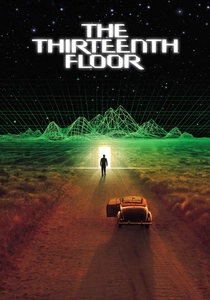
The Thirteenth Floor (1999)
Description: The Thirteenth Floor shares Tron's central premise of characters discovering they are part of a simulated reality. Both films explore the philosophical implications of virtual worlds and the nature of existence. The noir-inspired visual style of The Thirteenth Floor, while different from Tron's digital aesthetic, similarly creates a sense of unease and uncertainty about what is real. The films also both feature protagonists who must navigate and ultimately escape their artificial environments.
Fact: The Thirteenth Floor is based on the 1964 novel 'Simulacron-3' by Daniel F. Galouye. The film was released the same year as The Matrix, leading to comparisons between the two. Despite its intriguing premise, The Thirteenth Floor was overshadowed by The Matrix's success.
 Watch Now
Watch Now 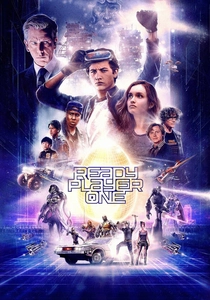
Ready Player One (2018)
Description: Ready Player One shares Tron's central theme of a virtual world where users can escape their mundane realities. Both films feature protagonists who navigate and ultimately triumph within a digital universe. The visual style of Ready Player One, with its vibrant, game-like environments, mirrors Tron's pioneering use of computer-generated imagery to create a digital realm. The films also explore the idea of digital avatars representing real people, a concept that was groundbreaking in Tron and remains relevant today.
Fact: Ready Player One is based on the 2011 novel of the same name by Ernest Cline. The film includes over 100 pop culture references, from classic video games to iconic movie characters. Steven Spielberg directed the film, marking his return to science fiction after a long hiatus.
 Watch Now
Watch Now 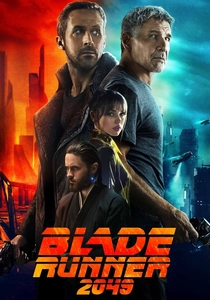
Blade Runner 2049 (2017)
Description: As a sequel to Blade Runner, Blade Runner 2049 continues the themes of its predecessor while also sharing similarities with Tron. The film's exploration of artificial intelligence and digital consciousness resonates with Tron's depiction of sentient programs. Both films feature stunning visual effects that create immersive, futuristic worlds. The emotional tone of isolation and the search for identity in a technologically advanced society is another common thread between the two films.
Fact: Blade Runner 2049 was directed by Denis Villeneuve, known for his work on Arrival and Dune. The film won two Academy Awards for Best Cinematography and Best Visual Effects. Ryan Gosling's character, K, was originally written as a more traditional action hero before being reimagined as a more introspective figure.
 Watch Now
Watch Now 
